For years, electric cooperative leaders have fretted watching rural kids grow up, leave for college, and then head to big cities rather than return home. With the growing number of retirements, unemployment rates dropping, and an unprecedented war for talent in the energy industry, Kansas has found some good news in busting one talent myth.
As
RE Magazine discovered, rural America is populated with people who did make it back home. Some found life in the big city wasn’t all it’s cracked up to be. Others saw fate intervene.
We spent a week crossing Kansas—driving more than 1,000 miles—so they could share their stories.
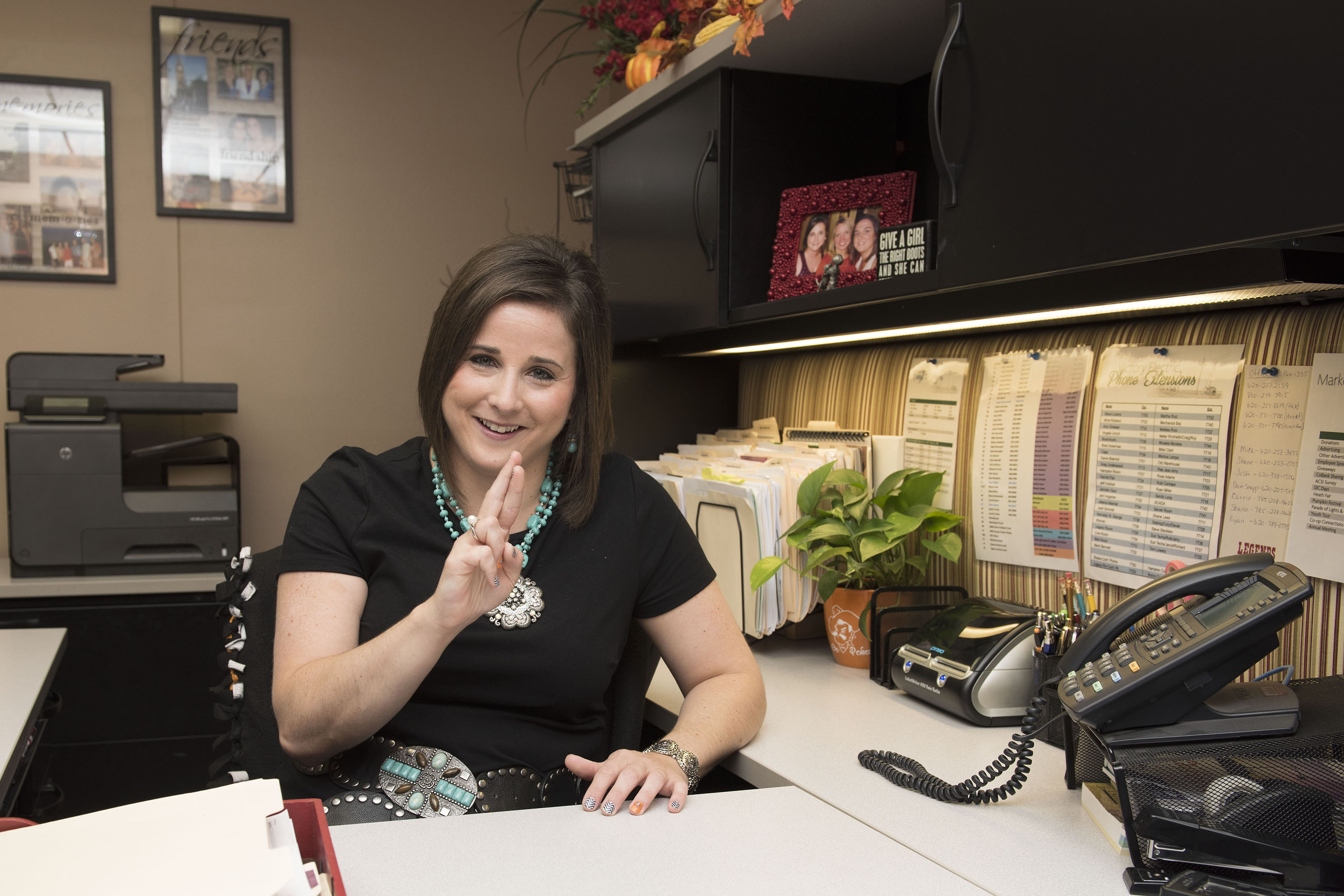
Farm Girl Meets Big-City Life
Growing up near Red Rock, Okla., Jerri Imgarten had no idea what she wanted to do—except go to the next Kay Electric Cooperative annual meeting.
“They always had a really good kids program,” she remembers. “During the annual meeting, the kids would go watch a movie, and they’d have prizes.”
One thing’s for sure: It was a happier time than life in the big city would later turn out to be. And that ultimately brought her to Dodge City, Kan., where she’s manager of marketing and communications at The Victory Electric Cooperative.
[image-caption title="Jerri%20Imgarten,%20who%20grew%20up%20on%20co-op%20lines,%20quickly%20realized%20big-city%20life%20wasn%E2%80%99t%20for%20her%20and%20was%20happy%20to%20land%20at%20The%20Victory%20Electric%20Cooperative%20in%20Dodge%20City,%20Kan." description="(Photo%20courtesy%20Steven%20Hausler)" image="/remagazine/articles/PublishingImages/Jerri-Imgarten-truck-396x600.jpg" width="425" /]
A farm girl who was in 4-H and FFA and showed animals at fairs, Imgarten, 30, liked agriculture, though when it came time to go to Oklahoma State University, “I honestly just kind of pointed to a major on the map.”
But one semester in the biochemistry lab was enough, and she switched to agricultural communications. When an internship was required to graduate, she found herself spending the summer of 2007 at Kansas Electric Cooperatives, the statewide association in Topeka, working with Shana Read, director of communications.
“I wrote a lot for
Rural Power, which is the statewide newsletter that goes to all the co-op directors and trustees and employees. I did a couple feature articles for the
Kansas Country Living magazine. I did some design work as well,” Imgarten says. “I loved it.”
Returning to school, Imgarten heard from a friend who worked at the local co-op. He saw on Facebook that Imgarten interned at the statewide and asked if she’d be interested in a part-time job.
“So I worked for Central Rural Electric [CREC] in Stillwater [Okla.] for a semester,” she recalls. “I coordinated their Youth Tour program, and then I also kind of coordinated their Operation Round Up.”
Upon graduating in December 2007, Imgarten had job offers from CREC, Victory—to which Read had directed her—and Adfarm, an agricultural advertising agency in Kansas City, Mo.
“I struggled, going back and forth between this job and the one in Kansas City. But ultimately I think, being young, I didn’t know anybody for 300 miles out here. So I ended up going to Kansas City where I knew some people here and there,” Imgarten says. “I graduated on Saturday, and I started on Monday.”
It wasn’t quite Tuesday when she began having second thoughts, but they came soon enough.
“One of the things I loved about the co-op is I got to do it all,” Imgarten says. At the agency she was working in public relations, while specialists handled copywriting, art, and other responsibilities that interested her.
“After a few months, I just knew it wasn’t what I wanted,” she says. “I was in downtown Kansas City, and I was a farm girl. I don’t regret going there, but it wasn’t for me.”
So she took a chance and called Read at the statewide to see if the Victory position was still available. Read thought so and encouraged her to call and ask. Amazingly, she was told the job was still hers if she wanted it.
“Two weeks later, I was in Dodge.”
That was April 28, 2008, and Imgarten hasn’t looked back.
“I wanted to be somewhere small town, rural. I’m not saying small town as far as 100 or 200 people. I mean, just a smaller, more rural feel. I grew up in that, and the friendliness,” she says. “In Kansas City I lived in an apartment complex, and I had no clue who my neighbors were. I didn’t know a single one of them. In a small town, you know every single neighbor; they come and introduce themselves. It’s a different feel. It’s a different atmosphere.”
After work, there’s enough in Dodge to keep her busy, including concerts, movies, and a young professionals group. “But I’m not one of those people that has to have something to do all of the time,” she says.
Her family in Oklahoma still farms wheat and other crops as well as cattle, and the four-hour drive makes it easy to visit. Otherwise, she can spend the weekend renovating the three-bedroom, two-bath house she recently bought in Dodge City. Her days of battling Kansas City traffic are in the rearview mirror.
“I would say it takes me about a minute, minute and a half to get to work,” she says, laughing. “If I hit the stoplight, it takes me a little longer.”
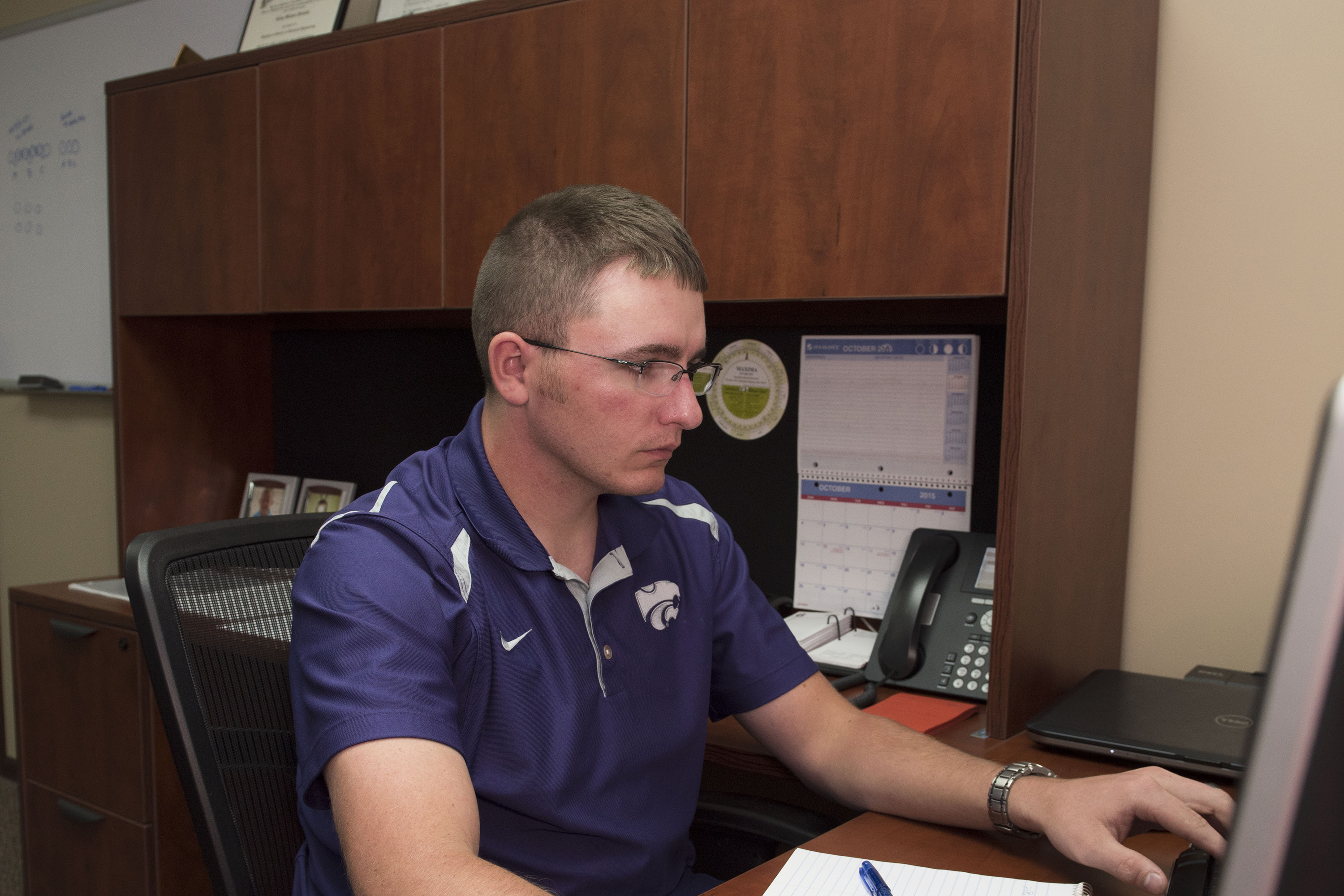
The Beach is Nice, But Kansas is Nicer
Why did Kody and Staci Pounds leave Kansas for Delaware? The answer is simple.
“Out of all my job offers, that was the furthest one,” Kody laughs. It also offered the best pay and benefits.
But barely two years later, they were back in Kansas, with Kody working at a G&T.
[image-caption title="Kody%20and%20Staci%20Pounds%20moved%20to%20Great%20Bend,%20Kan.%20after%20giving%20Delaware%20a%20try." description="(Photo%20courtesy%20Steven%20Hausler)" image="/remagazine/articles/PublishingImages/pounds-cover-vert-400x600.jpg" width="425" /]
Newark, Del., is about exactly halfway between New York City and Washington, D.C., along Interstate 95. It’s best known for the huge mall that attracts people from neighboring states to Delaware’s tax-free shopping. Commuter trains get you to Philadelphia in about an hour.
It was quite a change for Kody, an engineer, and Staci, a full-time mom. Their high school graduating classes in Kansas had nine and seven students, respectively.
“I had a couple job offers for companies here in the Midwest, in Kansas and Oklahoma. But we were young—it was just me and my wife, and at that time our son was four—and we decided we’d like to see a little bit different part of the country,” Kody, 25, says of their days after graduating from Kansas State University.
“I didn’t want to go at first,” Staci, 27, readily admits. But after some convincing, in 2011 they loaded a moving truck in the middle of a snowstorm and drove east so Kody could work for Pepco, an investor-owned utility.
On days off, the family visited Philadelphia, Baltimore, and Washington, all easy drives. They often went to the beach, which was a treat because, as Kody jokes, “We don’t have that much water in Kansas.” The first time Staci’s parents ever flew on an airplane was to see them.
But something wasn’t right. Even moving from an apartment to a rented house didn’t help.
“I was used to small-town living,” Staci says. There were too many people for her tastes. She drove in heavy traffic only once, which was one time too many. Pregnant with daughter Karly, she’d drive to doctor appointments, and that was about it.
And Delaware just wasn’t what she was used to.
“When you walked around, people wouldn’t look at you. They always looked down at the ground. That’s something we don’t do here. We walk by someone, and we look right at them,” Staci says.
“The only reason we met one set of neighbors is because they saw we had Kansas tags on our vehicles, and they were from Nebraska,” Kody adds. “But they moved.”
Still, they weren’t planning to leave Delaware just yet—until one day when Kody was on LinkedIn and saw that a friend had liked a job posting at Sunflower Electric Power Corp. in Hays, Kan. It was for a planning and distribution engineer, exactly the job he was doing.
“I applied for it, and right away I got a call back from HR. They knew I was from Kansas, and so they got me an interview right away,” Kody recalls.
On the day Karly was born, they got a second flash of good news: The Sunflower job was his. He started six weeks later, on September 30, 2013.
While they were friendly with Kody’s Pepco co-workers, he says it’s different with the people at Sunflower and its distribution co-ops.
“A lot of them are farm kids, and we all have the same hobbies and enjoy the same things,” he says. “It’s a lot more personal now working here in Kansas.”
[image-caption title="Kody%20Pounds%20watches%20his%20son%20practice%20football%20in%20Great%20Bend,%20Kan.,%20where%20the%20family%20lives." description="(Photo%20courtesy%20Steven%20Hausler)" image="/remagazine/articles/PublishingImages/NextGenWorkforce-10_RESIZED-600x432.jpg" /]
Kody works out of Sunflower’s Great Bend office, and the couple bought a house in a quiet neighborhood—paying about half of what it would’ve cost in Delaware. It’s five minutes from the office.
“A traffic jam here in Kansas is five vehicles behind a tractor or something like that,” he laughs.
Daughter Kora joined the family in 2015. Kaden bikes to the elementary school down the street and is active in sports.
“We have two other Sunflower employees that live on our block, and all of our kids play. If my son’s not down there playing with them, they’re usually over at our house playing,” Kody says.
Relatives are within a 90-minute drive—no need to buy plane tickets months in advance. “If we just decide to drive home one weekend, it’s no big deal,” Kody says.
“I’m glad we did it. I am,” Kody says of heading east. “But I’m glad we’re back in Kansas.”
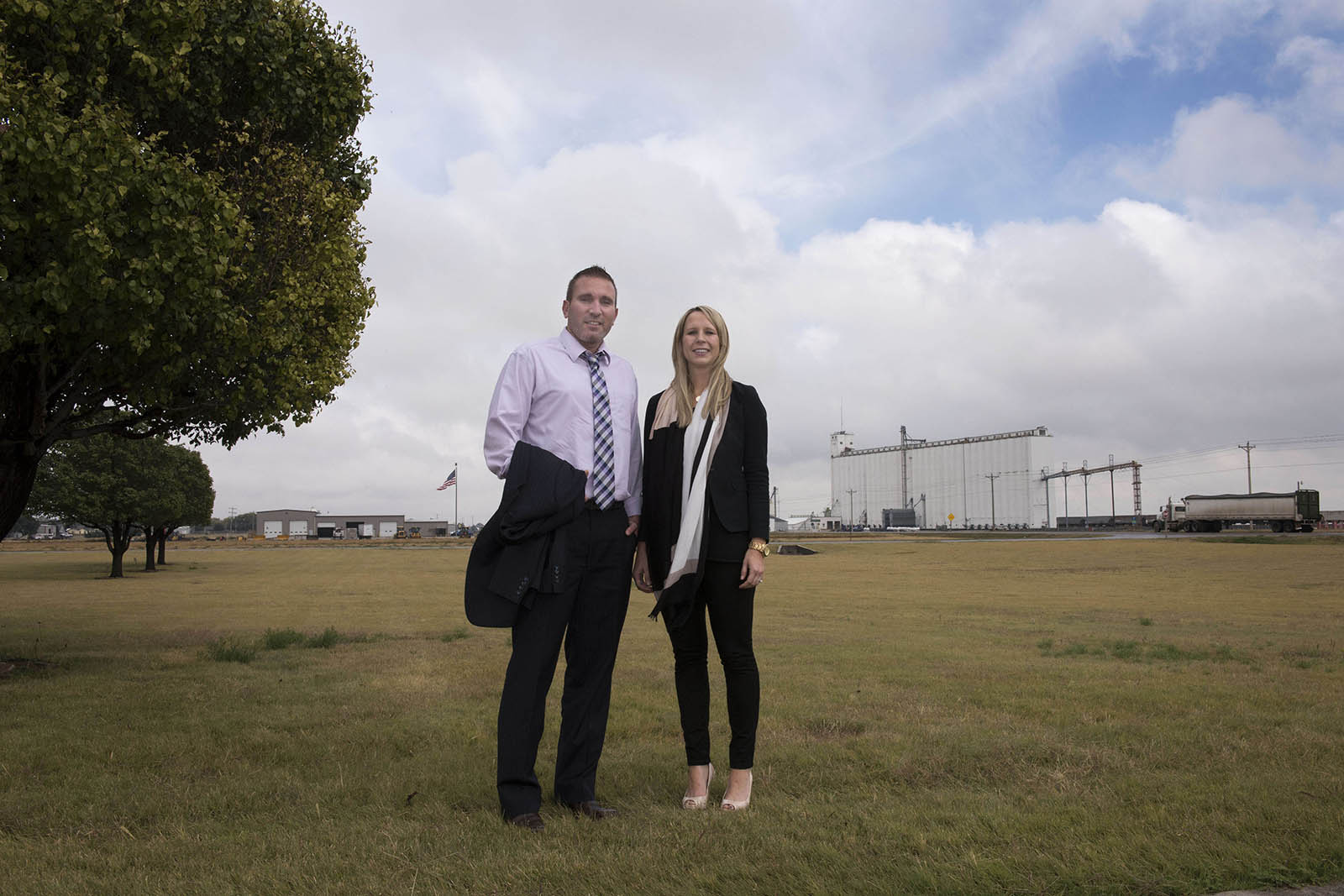
Lawyers in Love...With Small-Town Life
If NBC decides to reboot
L.A. Law, Chris and Lindsay Shepard would be just about perfect to play husband and wife attorneys. That’s what they are in real life.
OK, they’re not actors. But you could easily see them working at a large law firm in New York or Los Angeles. There’s only one thing: They’re quite happy, thank you, in rural Kansas.
[image-caption title="Lindsay%20and%20Chris%20Shepard%20are%20husband%20and%20wife%20lawyers%20who%20met%20at%20the%20University%20of%20Kansas%20and%20love%20rural%20life." description="(Photo%20courtesy%20Steven%20Hausler)" image="/remagazine/articles/PublishingImages/shepards-cover-vert-400x600.jpg" width="425" /]
Lindsay, 33, is executive vice president-general counsel at Pioneer Electric Cooperative, Inc., in Ulysses. Chris, also 33, is a partner at Watkins Calcara in Great Bend, specializing in insurance defense. They met at the University of Kansas and married a month after graduating from law school in 2007.
“Most people strive when you graduate from law school to go to the big law firms. So that’s kind of what I was thinking—we’d at least end up in Kansas City, probably, as a starting point, maybe Chicago, Dallas,” says Lindsay, who grew up on a Kansas farm between Scott City and Garden City. “But we ended up taking a different route.”
That detour came when Chris was intrigued by one of Watkins Calcara’s requirements for an on-campus interview.
“They said you had to have a sense of humor.”
Chris, who’s from Topeka, was also thinking “it wouldn’t be bad to be some place in between” their hometowns if they couldn’t find something in a bigger city. He accepted an offer to go to Great Bend as Lindsay was contemplating a job offer with Koch Industries in Wichita, two hours southeast.
They were figuring out how to live somewhere in the middle, but “Watkins Calcara didn’t want to have us living someplace else. They wanted us in Great Bend,” Chris recalls. “And so they actually talked to Lindsay and decided they wanted to hire her.”
“I would not trade for anything in the world where I grew up,” Lindsay says. “It was my foundation—my sole foundation—for where I am in life today and how I approach life. But, that said, I did not think I would be moving back anywhere west.”
Still, she went to Great Bend for what turned out to be “a great interview all the way around.” When they compared other opportunities to Watkins Calcara—where the partnership track was three years rather than the normal eight—it fell into place.
“I just never anticipated that that’s the route we would go coming out of law school,” Lindsay says. Nor did she anticipate what would happen next.
“Mark Calcara, who is the Calcara in Watkins Calcara, is general counsel for Sunflower [Electric Power Corp.] and is primarily who I worked under when I was at the law firm,” Lindsay says. In June 2011, the Hays-based G&T asked her to be its in-house associate general counsel and executive manager of the North American Electric Reliability Corp. (NERC) compliance program.
[image-caption title="Residents%20of%20Garden%20City,%20Kan.,%20the%20Shepards%20readily%20agree%20they%20made%20the%20right%20decision%20in%20their%20co-op%20careers." description="(Photo%20courtesy%20Steven%20Hausler)" image="/remagazine/articles/PublishingImages/shepard-cover-horiz-600x401.jpg" /]
“Chris has a lot of flexibility in his job. To the extent he’s not in court, he can work remote. So we moved to Hays,” Lindsay says.
While working at Sunflower Electric, Lindsay got to know Pioneer Electric’s CEO Steve Epperson, who sits on the G&T’s board. In late 2013, Epperson approached her with an offer she couldn’t refuse: Come to Pioneer to succeed the co-op’s general counsel, who was retiring.
At press time, the Shepards were in the process of moving from Hays to Garden City. In the meantime, Lindsay spends a lot of time with her parents in Garden City, while Chris spends a lot of time in his pickup truck.
“I probably drive 60,000 or so miles a year,” he says nonchalantly of crisscrossing Kansas for work, rarely seeing a rush hour. “Driving is actually peaceful.” Neither minds the time apart—each readily agreeing they made the right decisions. “I can’t imagine, going back, doing it any different,” Lindsay says.
But they also agree that young people from rural America should make up their own minds.
“I would say go off, experience it for five, 10 years. I think you owe that to yourself. But, at least for me, this is where I feel most at home. It all comes down to the people and relationships and just enjoying life,” Lindsay says.
“You’re not going to fail in a small town if you truly have a desire to be successful,” Chris adds. “In a big city, I think there are a lot of people who have the desire to be successful and a lot of them get lost in all the noise.”
[panel title="Mentoring%20the%20Co-op%20Workforce%20of%20Tomorrow" link-text="Read%20More" link="/remagazine/articles/pages/mentoring-co-op-workforce-tomorrow.aspx"]A lot of institutional knowledge could be on the verge of walking out the doors of America’s electric cooperatives. Some 14,400 co-op employees are eligible to retire over the next five years. So the time is now to get these veterans to share what they know with the folks waiting in the wings. That’s where the National Electric Cooperative Mentoring Program comes in. In collaboration with members of its Workforce Advisory Group, NRECA started the program in late 2015 with a goal of “facilitating the exchange of ideas and the transfer of knowledge within and across the electric cooperatives,” says Michelle Rostom, NRECA’s director of member workforce effectiveness. [/panel]
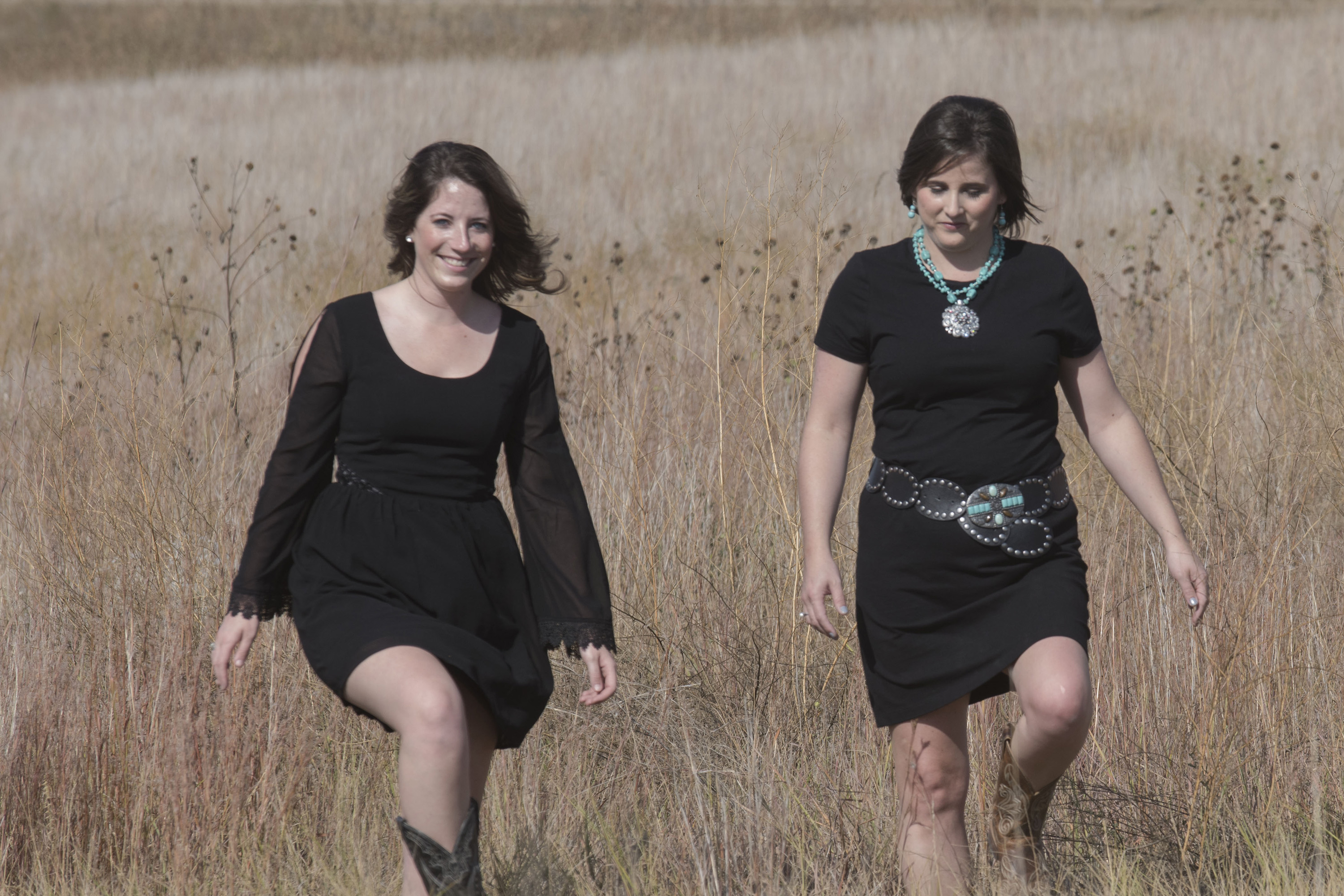
Don't Keep Everyone For Yourself
If you don’t want to work for Shane Laws the rest of your life, he won’t be upset—especially if your new opportunity is at another electric co-op.
“We have to change our mindset about staying forever. Millennials are not wired that way,” says Laws, CEO of The Victory Electric Cooperative in Dodge City, Kan. “We as leaders have to say, ‘We’re willing to let you go for the benefit of electric cooperatives nationwide.’”
[image-caption title="Kennedy%20St.%20George%20interned%20at%20the%20Kansas%20statewide%20association%20and%20Victory%20Electric%20Cooperative%20before%20joining%20Victory%20as%20a%20communications%20specialist." description="(Photo%20courtesy%20Steven%20Hausler)" image="/remagazine/articles/PublishingImages/kennedy-desk-475x600.jpg" width="425" /]
Laws sits on NRECA’s Workforce Advisory Group, which is focused on the cooperative network’s next generation workforce challenges. He says some of his fellow co-op leaders need to move past the old idea that employees will stay 30 years.
“Don’t keep everyone for yourself,” he says, noting that the ability to live just about anywhere in the nation is among the selling points of electric co-ops.
“We as CEOs have to change our whole thought process,” says Laws, a native of Godley, Texas, who grew up with electric co-ops.
His great-grandfather was on the board of United Cooperative Services (UCS) in Cleburne, Texas. His mother worked there in the 1980s. Laws started at UCS as a tree trimmer and earned his undergraduate degree at night. “I had the opportunity to work in various roles and learned a great deal about the business at UCS.”
The big city called, and Laws then went to work in Arlington, Texas, at SBC Communications, which is now AT&T. And while he picked up a lot of good experience, “corporate America was not for me,” Laws says.
“The co-op is in my blood,” he says. “Fortunately, I was hired by another cooperative, CoServ Electric, located in Corinth, Texas. It was a fantastic place to work and learn.”
At CoServ, he served in various capacities while earning his MBA, but he says he ultimately wanted to manage a cooperative.
In 2013 he got his chance at Victory. “It’s like where I grew up,” Laws says of Dodge.
He calls it crucial to educate the next generation about the cooperative difference. “A lot of people don’t know what we have to offer,” Laws says.
One of his newest employees benefited from just such an education.
Kennedy St. George joined Victory as a communications specialist in June 2015. Though she interned at Victory a year earlier, between her junior and senior years at Kansas State University, it wasn’t what she was thinking of growing up on a farm in Columbia City, Ind.
“It was a dream of mine to actually live in New York City,” says St. George, 21. “I always liked going to Chicago and seeing the city lights and doing those things. It was so different from home.”
Although the family farm was served by Columbia City-based Northeastern REMC, where her grandfather was on the board and she attended annual meetings, “I didn’t know anything about cooperatives,” St. George admits.
That changed at a career fair where she met Carrie Kimberlin, communications specialist for Kansas Electric Cooperatives, the statewide association that publishes
Kansas Country Living magazine.
[image-caption title="Victory%20Electric%20Cooperative%20employees,%20Kennedy%20St.%20George,%20Jerri%20Imgarten,%20and%20Shane%20Laws." description="(Photo%20courtesy%20Steven%20Hausler)" image="/remagazine/articles/PublishingImages/victory-group-600x400.jpg" /]
“The only thing that attracted me was that it was a magazine, and I knew I wanted to write,” St. George recalls. “I went for an interview, knew nothing about cooperatives, and learned it all just at the office at the statewide. And then I was infatuated with the linemen and what they did.”
Interning at the statewide led to the chance to intern at Victory, followed by the full-time job she has now.
“I moved to Dodge because I love my job. And the more that I’m out here, the more I learn to appreciate a rural lifestyle, more than I did even when I was in high school and in college,” St. George says. “People are just living. It’s not rushed. And out in rural communities, people stop and say hello and talk to you and ask how you are,” she says.
“I don’t think I could live in Chicago anymore. I don’t think I could.”
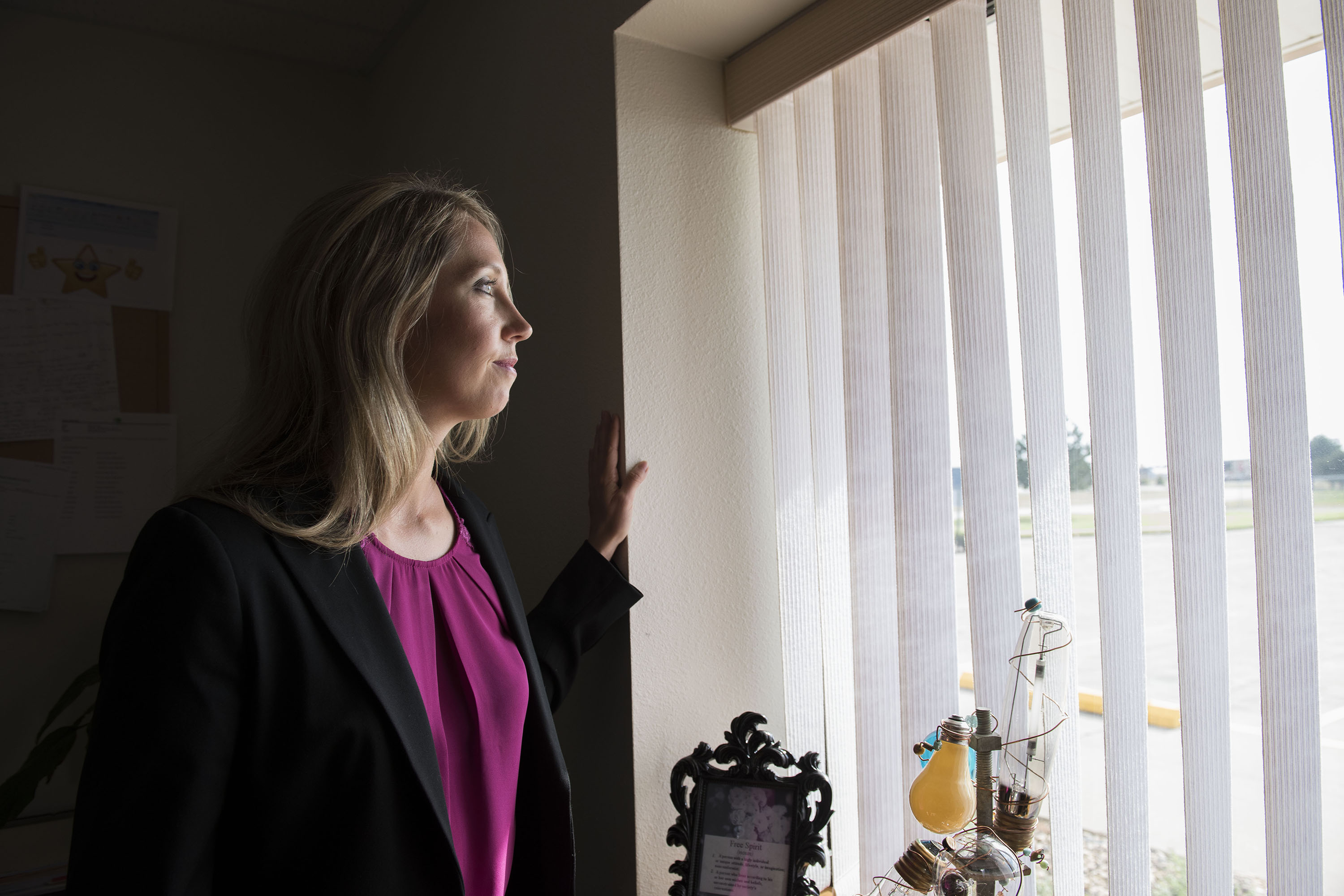
A 150-mile Trip Made the Long Way
Elyse Molstad’s life story sounds like a cross between reality TV and a sitcom. Her journey took her from Oakley, Kan., to Liberal, Kan.—a mere 150 miles away—via Florida, Colorado, and Hawaii. After careers in TV news and sales, a horrific dog attack, and some other wildcards life tossed her way, Molstad is now energy services coordinator at Southern Pioneer Electric Company.
“I was definitely going to be a doctor, but three semesters of pre-med and one grueling organic chemistry class at Colby Community College changed my mind.”
She graduated in 2004 with an associate of science degree in TV and radio. “My goal at this point shifted from being a doctor to kicking Katie Couric out of
The Today Show,” she says with a laugh.
[image-caption title="Elyse%20Molstad%20worked%20in%20TV%20news,%20a%20hardware%20store,%20and%20a%20variety%20of%20other%20jobs%20before%20settling%20in%20at%20Southern%20Pioneer%20Electric." description="(Photo%20courtesy%20Steven%20Hausler)" image="/remagazine/articles/PublishingImages/molstad-nextgen-cover-400x600.jpg" width="425" /]
No one starts out on network television, so she got her first TV reporting job at an NBC affiliate station in Panama City Beach, Fla., after graduating with a communications degree from Kansas State University.
By 2006 she was reporting and anchoring from Garden City, Kan., for a Wichita TV station. After several years of being in front of the camera, Molstad made a career change to become a TV station account executive. “I used my Spanish and sales skills to help launch the first Spanish newscast in Kansas,” she says.
In 2012, Molstad moved to Colorado Springs, Colo., to be a project manager for a friend’s roofing company.
And then came “the day that my life changed,” she says.
“I was walking up to a house to speak to the homeowner, when all of a sudden two large dogs burst out of the house. I jumped a fence to get away from them. The end result: a major knee injury, surgery, and four months on crutches.”
Finally on the mend and ready to ease back into the working world, Molstad’s best friend from college found a short-term job for her. It took little urging from her friend to convince Molstad to join in her Maui, Hawaii.
But all good things must come to an end, and by 2013 she was living in Colby, Kan., assisting her grandmother. Molstad worked as a substitute teacher and in a hardware store while applying for jobs in her field of expertise. Then a friend in Garden City sent her two job ads.
“The zoo in Garden city was looking for an elephant keeper. I said, ‘Really funny. Look what dogs did to me. What do you think an elephant would do?’” Molstad laughs.
The second ad was for a communications specialist position at Pioneer Electric Cooperative in Ulysses. Molstad applied and was offered a job in Liberal, Kan., at Southern Pioneer Electric, a wholly-owned subsidiary of Pioneer Electric.
She’d been to Liberal once before as a TV reporter, covering the annual Pancake Day Race where women runners from Olney, England, and Liberal compete for the best race time, all while flipping pancakes.
When she’s not at Southern Pioneer, you might find Molstad serving on the board at Baker Arts Center, traveling to see friends and family, and performing standup comedy. Recently, Molstad was the featured speaker for the incoming freshmen at her alma mater, Colby Community College.
“I told them, just because you’re in a small town doesn’t mean you have to have a small life.”
